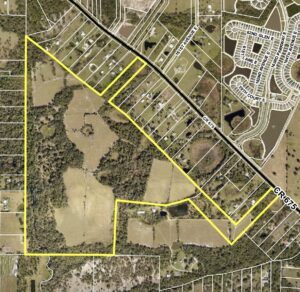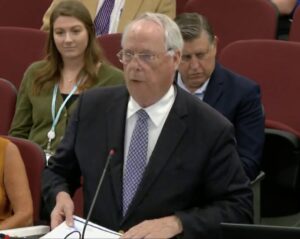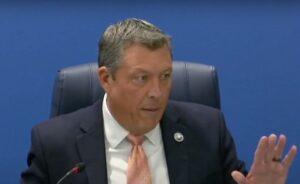The county commission’s recent pushback against developers has them up against the state government as well.
By Noah Vinsky
Original Air Date: July 4, 2025
Host: Neal Communities has built over 23,000 homes in Southwest Florida, mostly in Manatee and Sarasota Counties. On June 19, a plan to build 440 more in Manatee County was shut down. In the big picture, that seems like a blip on the political radar. But the unanimous vote by a county commission on Pat Neal’s home turf is more than a rare occasion now. It was just the latest incident in escalating tensions between Manatee County on one side and developers and the State of Florida on the other side. Noah Vinsky reports about a recent battle won by the developers.

Map showing the perimeter of the Pope Ranch project.
Noah Vinsky: Neal sought a rezone of 217 acres along Rutland Road for a project called Pope Ranch—an area that flooded during last year’s storms.
The project was unanimously denied by the seven Manatee commissioners. County planning staffers cited the destruction of wetlands and gopher tortoise burrows. Neal told the Sarasota Herald-Tribune he plans to fight the decision, saying “Standby. This is not over.”
It’s another chapter in what has been a months-long battle between developers and a Manatee County Commission that added three grassroots candidates in the November election. Bob McCann and Carol Felts, and—to a certain degree—Tal Siddique, have tried to make life harder for developers. McCann and Felts have dropped the M word—a moratorium on new construction—and they have been the driving forces behind more scrutiny for new projects as well as efforts to strengthen local environmental regulations and reinstate the urban development boundary.
Amid a drastic slowdown in the real estate market, the county’s decisions to raise impact fees and reintroduce wetland buffers have also affected developers’ bottom line. In June, the board voted to raise impact fees to 100% of what a consultant recommended years ago. Prior to the vote, Neal threatened to hit the county with lawsuits over the increase.

Pat Neal
But Neal and Tallahassee have been pushing back on efforts to slow development. Neal saw a win last week when Florida Governor Ron DeSantis signed Senate Bill 180 into law. The bill includes a provision that places restrictions on local governments adopting land-use changes.
That provision could also prevent hurricane-stricken communities, like Manatee County, from building back stronger after storms, says County Commission Chair George Kruse. Kruse attacked the state’s decision to pass the bill in a Facebook post, calling it “destructive.” Kruse also said the legislation was “hijacked by a single Manatee County developer.”
We tried to seek comment from Neal Communities over a 24-hour period by phone call and email.
Kruse wrote that Senate Bill 180—simply named “Emergencies”—started out as a great bill with measures to better prepare residents for hurricanes. But the bill’s vague, one word-title allowed for less desirable amendments to be added. In a one-hour interview on WSLR’s The Detail with Cathy Antunes on Thursday, he elaborated.

George Kruse
George Kruse: That opened up an opportunity to put anything in there that somebody could even perceive to be relative and related to an emergency.
NV: Kruse says the bill’s language regarding development and building moratoria has nothing to do with emergencies. He also cited Senate Bill 250, which was passed following Hurricane Ian and recently extended until October 2026.
That law applies to 10 counties impacted by the storm, including Manatee, and handcuffs local governments from passing more restrictive development rules following hurricanes.
GK: It’s been destructive in terms of doing what the people of Manatee County want and voted for, especially in the 2024 election.
NV: That bill also prevented Manatee County from putting back on the books wetland protections a previous county commission had stripped. Even so, the county commission approved a return of wetland buffers in April. Since then, the county commission has been locked in a battle with the state over the requirement. In May, several state agencies swamped the commission’s final vote, questioning its legality.
Kim Dinkins is a policy and planning expert with the environmental advocacy group 1000 Friends of Florida. She says Senate Bill 180 will impact local efforts to preserve the environment.
Kim Dinkins: Anything that would address connection to water or sewer, increased stormwater protections and those types of things would be policies prevented from being implemented.
NV: But that’s not all. In June, the commissioners also repealed a 2021 amendment that allowed for the construction of thousands of new homes outside development boundaries. Kruse says, once again, the state is alleging that rollback is a violation of Senate Bill 250.
Kruse blames the broad language in both bills for the state’s efforts to block any changes to local planning rules.
GK: We were told the intent of that language was for rebuilding existing structures that were damaged after in a storm. You don’t want us stopping people from rebuilding their homes or their businesses. But by the very definition of what we’re proposing to you for the wetlands, there’s no development around there right now.
NV: Dinkins says Senate Bill 180 is an extension of 250 passed a few years ago, and both bills are blocking local governments’ ability to manage development.
KD: We’re building and rebuilding in the same way, and not being able to address the issues with rebuilding is a problem for local governments.
NV: Hurricane Ian in 2022 cost Manatee County about $96 million in damage. Helene and Milton totaled out to over $350 million a piece. Over 5,000 buildings were damaged in the county during last year’s storms alone. Dinkins says bills like these don’t make communities safer.
KD: We’re in this vicious cycle of storm destruction, building, storm destruction, rebuilding in the same way. We’re not increasing the resiliency of Florida’s homes or Florida properties because local governments are prevented from increasing their standards.
NV: Noah Vinsky for WSLR News. To listen to the full interview with George Kruse, go to archive.wslr.org and look for the latest edition of The Detail.
WSLR News aims to keep the local community informed with our 1/2 hour local news show, quarterly newspaper and social media feeds. The local news broadcast airs on Wednesdays and Fridays at 6pm.